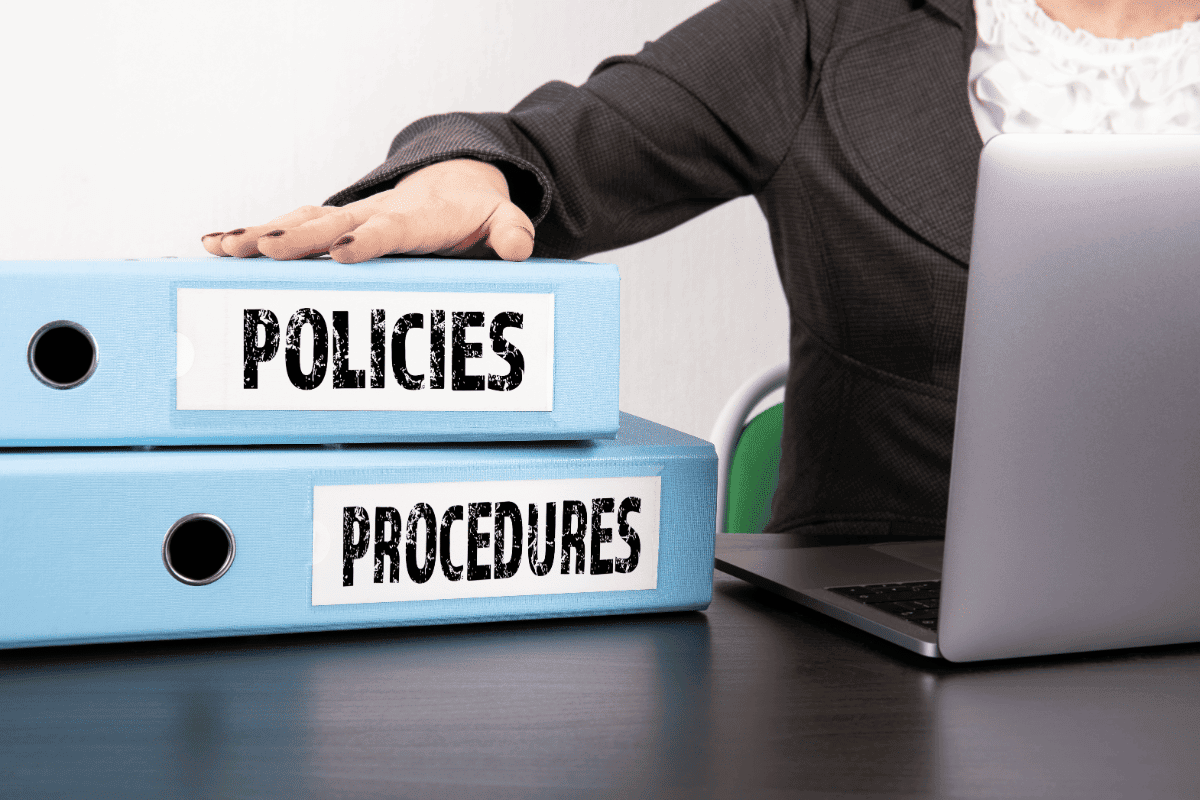Customer Service Policies And Procedures: Guidelines For Consistent Service Delivery
Are you looking to improve your company’s customer service? In today’s competitive business landscape, providing exceptional customer service is crucial for building long-term relationships with your clients.
That’s where customer service policies and procedures come into play. By establishing clear guidelines for consistent service delivery, you can ensure that every interaction with your customers is handled efficiently and effectively.
By implementing customer service policies and procedures, you set clear expectations for your employees. They know exactly what is expected of them when it comes to interacting with customers, resolving issues, and representing your brand. This clarity helps to create a consistent experience for your customers, no matter who they are dealing with in your organization.
In addition to setting expectations, comprehensive training and development programs are essential for equipping your employees with the necessary skills to deliver excellent customer service. These programs should cover everything from product knowledge to communication techniques, empowering your staff to handle any situation that may arise. By investing in their professional growth, you not only enhance their abilities but also boost their confidence in providing top-notch service.
Effective communication channels are another vital aspect of successful customer service policies and procedures. Your customers should be able to easily reach out to your team through various channels such as phone calls, emails, or live chat support. Similarly, internal communication within the organization needs to be efficient so that information can be shared seamlessly across departments when addressing customer inquiries or concerns.
Resolving customer issues promptly is crucial in maintaining high levels of satisfaction and loyalty. Your policies and procedures should outline a step-by-step process for handling complaints or problems swiftly while ensuring that each case receives the attention it deserves. Timely resolution not only resolves immediate issues but also demonstrates that you value the time and concerns of your customers.
Lastly, continuous evaluation and improvement are key components of effective customer service policies and procedures. Regularly assessing performance metrics allows you to identify areas where improvements can be made and implement necessary changes accordingly. Through feedback from both customers and employees, you can gain valuable insights that help refine your service delivery and stay ahead of the competition.
In conclusion, customer service policies and procedures are vital for ensuring consistent service delivery. By setting clear expectations, providing comprehensive training, implementing effective communication channels, resolving issues promptly, and continuously evaluating performance, you can elevate your company’s customer service to new heights.
Remember, exceptional customer service is not just a goal; it should be a core value ingrained in every aspect of your organization.
Key Takeaways
- Comprehensive training and development programs are crucial for consistent service delivery.
- Effective communication channels, both internal and external, are vital for successful customer service.
- Resolving customer issues promptly and efficiently is crucial for customer satisfaction.
- Continuous evaluation and improvement of customer service policies and procedures are necessary to maintain high levels of customer satisfaction.
Establishing Clear Expectations for Employees
You need to clearly communicate your expectations to your employees so they understand exactly what’s expected of them and can deliver exceptional customer service. Employee accountability is crucial in ensuring consistent service delivery.
By setting clear expectations, you establish a framework for performance evaluations and hold employees accountable for their actions. Clearly define the standards and behaviors that are expected from your employees, such as being polite, responsive, and knowledgeable when dealing with customers.
Regular performance evaluations are essential in measuring employee performance and providing feedback on areas for improvement. These evaluations help determine if employees are meeting the established expectations and identify any gaps in their skills or knowledge.
During these evaluations, provide specific examples of both positive and negative behaviors observed during customer interactions. This allows employees to understand where they excel and where they need to focus on improving.
In addition to communicating expectations through performance evaluations, it’s important to have ongoing communication with your employees about their progress. Regularly check-in with them, provide constructive feedback on their performance, and offer support or additional training if needed.
This open line of communication helps ensure that everyone is aligned with the customer service goals and reinforces the importance of delivering consistent service.
By establishing clear expectations for your employees, incorporating employee accountability into performance evaluations, and maintaining ongoing communication regarding progress, you create an environment that fosters consistent service delivery. When your employees know what’s expected of them and receive regular feedback on their performance, they’re empowered to consistently deliver exceptional customer service.
Providing Comprehensive Training and Development
When it comes to providing comprehensive training and development for your employees, there are a few key points to keep in mind.
First, it’s crucial to train your employees on effective communication and problem-solving skills so that they can provide excellent customer service.
Additionally, educating your staff on company policies and procedures will ensure consistency across the board.
Finally, offering ongoing training and development opportunities will allow your employees to continue growing and improving in their roles.
Training employees on effective communication and problem-solving skills
Incredibly, our training program transforms employees into master communicators and problem-solvers.
Through a combination of interactive workshops, role-playing exercises, and real-life scenarios, we equip our team with the essential skills needed to effectively communicate with customers and resolve conflicts.
Our training focuses on teaching active listening techniques, enabling employees to attentively listen to customer concerns and provide appropriate solutions.
To give you a glimpse into what our training program offers, here are five key elements that make it truly exceptional:
- Effective conflict resolution: We teach employees proven strategies for resolving conflicts in a constructive manner. They learn how to identify the root causes of disputes and work towards finding mutually beneficial resolutions.
- Active listening techniques: Our training emphasizes the importance of active listening in understanding customer needs and concerns. Employees learn to fully engage with customers by giving their undivided attention and responding empathetically.
- Problem-solving skills: We provide comprehensive guidance on developing effective problem-solving abilities. Employees gain the confidence to analyze situations from multiple perspectives and identify creative solutions.
- Empathy-building exercises: Our program includes activities that help employees develop empathy towards customers’ experiences. This enables them to connect emotionally with customers, leading to more personalized interactions.
- Role-playing scenarios: To reinforce learning outcomes, we incorporate realistic role-playing scenarios where employees can practice their communication and problem-solving skills in simulated customer interactions.
With these components at its core, our training program ensures that every employee becomes proficient in effective communication and problem-solving techniques.
Educating staff on company policies and procedures
Our comprehensive training program also includes educating staff on the ins and outs of our company’s policies and procedures. It’s crucial for our employees to have a clear understanding of these guidelines in order to provide consistent service delivery.
During this training, we ensure that our staff is familiar with all relevant policies, such as our return and refund policy, privacy policy, and customer complaint handling procedure.
By providing thorough staff training on policy awareness, we aim to equip our employees with the knowledge they need to effectively handle customer inquiries and issues. We emphasize the importance of adhering to these policies to maintain professionalism and ensure customer satisfaction.
Through interactive sessions and practical exercises, we help our staff develop a deep understanding of how each policy applies in different scenarios.
At the end of this training module, our employees are not only aware of the company’s policies but also understand their significance in delivering exceptional customer service. This education empowers them to confidently address any policy-related questions or concerns raised by customers.
By investing in staff training that focuses on policy awareness, we’re able to create a team that consistently delivers outstanding service while upholding the values and principles of our organization.
Offering ongoing training and development opportunities
Empower yourself with ongoing training and development opportunities, allowing you to grow and flourish in your role. By participating in continuous training programs, you can enhance your skills and stay up-to-date with the latest industry trends. This will not only make you more effective in providing excellent customer service but also open doors for professional growth and advancement within the company.
Here are some key benefits of ongoing skills development:
- Stay ahead of the competition: Continuous learning ensures that you remain knowledgeable about new technologies, tools, and techniques in customer service. This enables you to provide innovative solutions and stand out from competitors.
- Boost confidence: Ongoing training helps build confidence by expanding your knowledge base. As you acquire new skills, you become more self-assured when dealing with complex customer issues.
- Adaptability: The business landscape is constantly evolving, and ongoing training equips you with the flexibility to adapt to changes effectively. You can better understand customer needs as they evolve over time.
- Career advancement: Investing time in your professional growth through ongoing training demonstrates your commitment to personal development. It positions you as a valuable asset within the company, increasing your chances of career advancement opportunities.
Take advantage of these ongoing training opportunities to continuously improve your skills, enhance job satisfaction, and achieve long-term success in customer service.
Implementing Effective Communication Channels
Implementing effective communication channels is key to ensuring consistent and efficient service delivery. One important aspect of improving response time is utilizing technology effectively. By implementing tools such as live chat, email ticketing systems, and social media platforms, businesses can provide quick and convenient ways for customers to reach out with their inquiries or concerns. These communication channels allow for instant responses and reduce the need for customers to wait on hold or navigate through a complex phone menu.
Another way to improve response time is by utilizing automation in customer service communications. Automated emails or chatbots can be used to provide immediate acknowledgement of customer queries and set expectations regarding response times. This not only saves time for both the customer and the support team but also ensures that no inquiry goes unanswered.
In addition to improving response time, effective communication channels also facilitate clear and concise information exchange between customers and support agents. By providing access to knowledge bases or self-help portals, customers can find answers to common questions without needing assistance from a support agent. This frees up the support team’s time to focus on more complex issues while empowering customers with the information they need at their fingertips.
+————————+———————————————————–+—————————————-+
| Communication Channel | Benefits | Considerations |
+————————+———————————————————–+—————————————-+
| Live Chat | – Instantaneous responses | – Requires trained staff |
| | – Real-time problem-solving | – May not be available 24/7 |
| | – Personalized interactions | |
+————————+———————————————————–+—————————————-+
| Email Ticketing Systems| – Allows detailed explanations | – Response times may vary |
| | – Provides a record of conversations | – Can get lost in spam filters |
| | – Can handle high volumes of inquiries simultaneously | |
+————————+———————————————————–+—————————————-+
| Social Media Platforms | – Widens reach through social networks | – Requires active monitoring |
| | – Enables public feedback/response management | – Negative comments can go viral |
| | – Enhances brand reputation through prompt resolutions | |
+————————+———————————————————–+—————————————-+
Implementing effective communication channels is crucial for businesses aiming to deliver consistent and efficient customer service. By improving response time through technology utilization and implementing automation, businesses can provide quick and convenient solutions to customer inquiries. Additionally, clear and concise information exchange can be facilitated through knowledge bases or self-help portals, empowering customers with the information they need. By incorporating these communication channels into their service delivery strategies, businesses can enhance customer satisfaction and loyalty.
Resolving Customer Issues in a Timely and Efficient Manner
Maximize your efficiency by swiftly resolving customer issues, ensuring their satisfaction, and fostering loyalty.
When it comes to customer service, time is of the essence. Customers expect timely responses and efficient solutions to their problems. By promptly addressing their concerns, you not only meet their expectations but also demonstrate that you value their time and are committed to providing excellent service.
To resolve customer issues in a timely manner, consider implementing the following strategies:
- Prioritize urgent matters: Identify urgent issues and address them first. This shows customers that you understand the importance of their problem and are actively working towards a resolution.
- Streamline communication channels: Make it easy for customers to reach out to you by offering multiple communication channels such as phone, email, live chat, or social media platforms. This allows them to choose the most convenient option for them.
- Empower frontline staff: Equip your frontline staff with the necessary tools and authority to resolve customer issues on the spot. This eliminates unnecessary delays caused by having to seek approval from higher levels of management.
- Implement an efficient ticketing system: Utilize a ticketing system that tracks and organizes customer inquiries. This ensures that no issue falls through the cracks and enables you to provide updates on progress.
- Continuously improve processes: Regularly review your customer service procedures and identify areas for improvement. By streamlining processes and eliminating bottlenecks, you can enhance your ability to resolve issues quickly.
By efficiently resolving customer issues in a timely manner, you not only satisfy immediate needs but also build long-term relationships based on trust and loyalty. Remember that every interaction is an opportunity to delight customers with exceptional service.
Continuously Evaluating and Improving Customer Service
Now that you understand the importance of resolving customer issues in a timely and efficient manner, it’s crucial to continuously evaluate and improve your customer service.
Evaluating the effectiveness of your customer service policies and procedures is essential for ensuring that you’re consistently delivering high-quality service. By gathering feedback from customers, you can identify areas where improvements can be made and make necessary adjustments to enhance the overall customer experience.
One way to evaluate the effectiveness of your customer service is by regularly soliciting feedback from your customers. This can be done through surveys, online reviews, or even direct conversations with customers. By actively seeking input from those who’ve interacted with your customer service team, you’ll gain valuable insights into what’s working well and what needs improvement. This feedback will enable you to make data-driven decisions on how to enhance your processes and better meet the needs of your customers.
In addition to gathering feedback from customers, it’s also important to analyze key performance indicators (KPIs) related to customer service. These KPIs may include metrics such as average response time, resolution rate, or customer satisfaction scores. By tracking these metrics over time, you can identify trends and patterns that may indicate areas for improvement. For example, if there’s a consistent increase in average response time, it may suggest a need for additional resources or process optimization.
Overall, continuously evaluating and improving your customer service is vital for maintaining high levels of customer satisfaction. By gathering feedback from customers and analyzing relevant KPIs, you can identify areas where enhancements are needed and implement changes accordingly. Remember that effective communication with both internal teams and external stakeholders is crucial during this evaluation process so that everyone involved understands the goals and objectives of improving customer service delivery.

Frequently Asked Questions
What are the specific steps to follow when handling a customer complaint?
When handling a customer complaint, you need to follow specific steps in order to ensure a smooth resolution process.
First, empathize with the customer and actively listen to their concerns. Make them feel heard and understood.
Then, apologize for any inconvenience caused and take ownership of the situation.
Next, ask questions to gather all the necessary information about the complaint. Once you have a clear understanding of the issue, propose a solution or options to resolve it.
Work collaboratively with the customer to find a mutually agreeable resolution.
Finally, follow up after resolving the complaint to ensure customer satisfaction and maintain good relations.
By following these specific steps, you can effectively address customer complaints and provide excellent service.
How can customer service representatives effectively handle difficult or angry customers?
To effectively handle difficult or angry customers, customer service representatives should be trained in de-escalation techniques and emotional intelligence. It is important to remain calm and composed when dealing with such customers.
Listen actively to their concerns and acknowledge their feelings without becoming defensive. Use empathy to understand their perspective and validate their emotions.
Apologize sincerely for any inconvenience caused and assure them that you’ll do your best to resolve the issue. Offer solutions or alternatives that can help address their problem.
Maintain a professional tone throughout the interaction and avoid taking things personally.
Remember, the goal is to find a resolution while preserving the relationship with the customer.
What is the protocol for escalating customer issues to higher management?
When it comes to escalating customer issues to higher management, the protocol typically involves a well-defined escalation process that ensures appropriate and timely managerial intervention.
In such cases, customer service representatives have the responsibility of identifying when an issue requires higher-level attention and taking the necessary steps to escalate it. This may involve documenting all relevant information about the customer’s concern, attempting to resolve the issue at their level first, and then seeking guidance from their immediate supervisor or manager if needed.
The escalation process is designed to ensure that difficult or complex situations receive the attention they require from higher management in order to find a satisfactory resolution for both the customer and the company.
How are customer service representatives trained to handle different types of customer inquiries or requests?
When training customer service representatives, various techniques are used to help them handle different types of customer inquiries or requests. One effective method is role-playing scenarios, where representatives simulate different customer situations and practice their responses. This allows them to develop problem-solving skills, empathy, and the ability to adapt to different customer personalities.
Through these training techniques, representatives learn how to effectively communicate with customers, provide accurate information, and resolve issues in a timely manner. Role-playing scenarios also help build confidence and prepare representatives for real-life interactions with customers.
What measures are in place to ensure consistent and high-quality customer service across different channels, such as phone, email, and live chat?
Ensuring consistent and high-quality customer service across different channels, such as phone, email, and live chat, is crucial for customer satisfaction.
While it may seem challenging to maintain the same level of service across various channels, our multichannel support measures are designed to overcome this obstacle.
Our highly trained customer service representatives are equipped with the necessary skills to handle inquiries or requests through different channels effectively.
We understand that each channel has its unique requirements, and our representatives undergo continuous training to adapt their communication styles accordingly.
By providing consistent training and guidance, we ensure that our representatives deliver exceptional service regardless of the channel used by customers.
This comprehensive approach fosters positive experiences for our customers and enhances their overall satisfaction with our services.
Conclusion
In conclusion, by implementing clear customer service policies and procedures, you can ensure consistent delivery of exceptional service to your customers. These guidelines will help establish clear expectations for your employees, providing them with the tools they need to excel in their roles.
One potential objection that may arise is the time and effort required to develop and implement these policies and procedures. However, it’s important to remember that investing in effective customer service practices can have a significant positive impact on your business. By providing comprehensive training and development opportunities for your employees, you’re empowering them to deliver outstanding service that exceeds customer expectations.
Imagine a scenario where a customer contacts your company with an issue or question, and they’re met with knowledgeable and well-trained staff who can quickly address their concerns. This level of efficient communication not only resolves the customer’s issue in a timely manner but also leaves a lasting impression of professionalism and competence.
By continuously evaluating and improving your customer service practices, you can stay ahead of changing trends and evolving customer needs. This proactive approach ensures that your business remains competitive in today’s fast-paced market.
In conclusion, adopting strong customer service policies and procedures is essential for any business looking to provide consistent high-quality service. Despite initial concerns about the time investment required, the long-term benefits far outweigh any challenges faced during implementation. So take the necessary steps now to create an environment where exceptional customer service isn’t just a goal but a reality for your organization.







